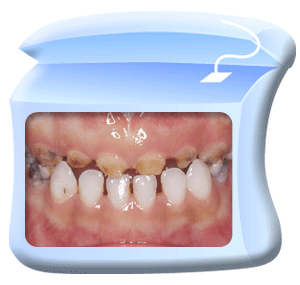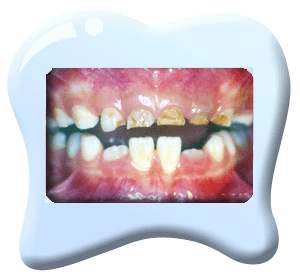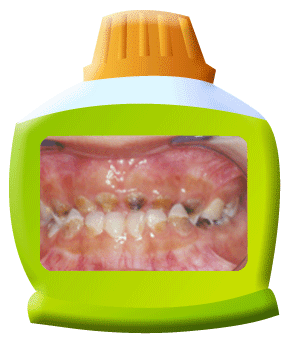Early Childhood Caries is an infant oral disease. The characteristic of this disease is the fast and widespread development of tooth decay.
At first, large lesions are found on the surface of the upper incisors.
Tooth decay follows the tooth eruption sequence, i.e. a tooth decays soon after it erupts. The decay will then spread to the teeth at the back.
Causes of 'Early Childhood Caries'
Improper feeding habits
- If parents continue to feed the child frequently and irregularly after he/she is 6 months old, bacteria inside the child's mouth will keep on utilizing the sugar in the food to form acid which is harmful to the child's teeth
- Leaving the milk bottle at the child's mouth for he/she to go to sleep will make the teeth to be soaked in milk for an extended period of time, and the teeth are subject to continuous acidic attack
- Toddlers generally can hold their own bottles after the age of one. If parents still allow toddlers to drink milk or other beverages with the milk bottle all the time, the bottle feeding period will be lengthened, and the risk of getting 'Early Childhood Caries' will increase significantly
Poor oral hygiene
- After the teeth have erupted, parents fail to remove dental plaque on the surfaces of the toddler's teeth daily
Consequences of having Early Childhood Caries:
Early Childhood Caries can result in pain, loss of appetite and even emotional irritation. If parents do not seek treatment for their children, bacterial infection can extend to the pulp, causing infection of the pulp and abscess. The bacteria can also affect the permanent teeth that are growing inside the alveolar bone through the roots of the primary teeth. When the condition gets severe, it can infect the child's cheeks, causing pain and swollen cheeks. At this stage, the child has to receive complicated dental treatment, which may include removal of the primary teeth. This will seriously affect the child's chewing ability, speech, alignment of permanent teeth and appearance, resulting in the loss of self-confidence.
Prevention for ‘Early Childhood Caries’
Good dietary habits
- No more than six regular meals a day should be allowed. After 2 years of age, only let your child eat three meals per day and take sufficient amount of food during each meal. One snack is allowed in between meals if your child feels hungry
- Do not let toddlers sleep with a bottle in their mouth
- Try to use a cup instead of a bottle for feeding when the toddler is about 9 months old
Appropriately clean the child’s mouth every day
- Starting from the baby's birth, parents should use gauze, cotton, or towel moistened with drinking water to clean the baby's mouth
- Wipe the front teeth when they are erupted
- Use a soft-bristled toothbrush to brush the teeth daily when the deciduous molars are erupted
- If the child knows how to spit out water, you can let him brush with children's fluoride toothpaste (a pea sized blob) every morning and before bed at night. Every night after the child brushes, parents should supplement his/her brushing
Regular dental check-up
A child should have his/her first dental check-up six months after he/she has his/her first tooth or when he/she is one year old. After that, parents should bring their children for regular dental check-up at least once per year.
Related topics:
Early Childhood Caries (PDF Leaflet)


